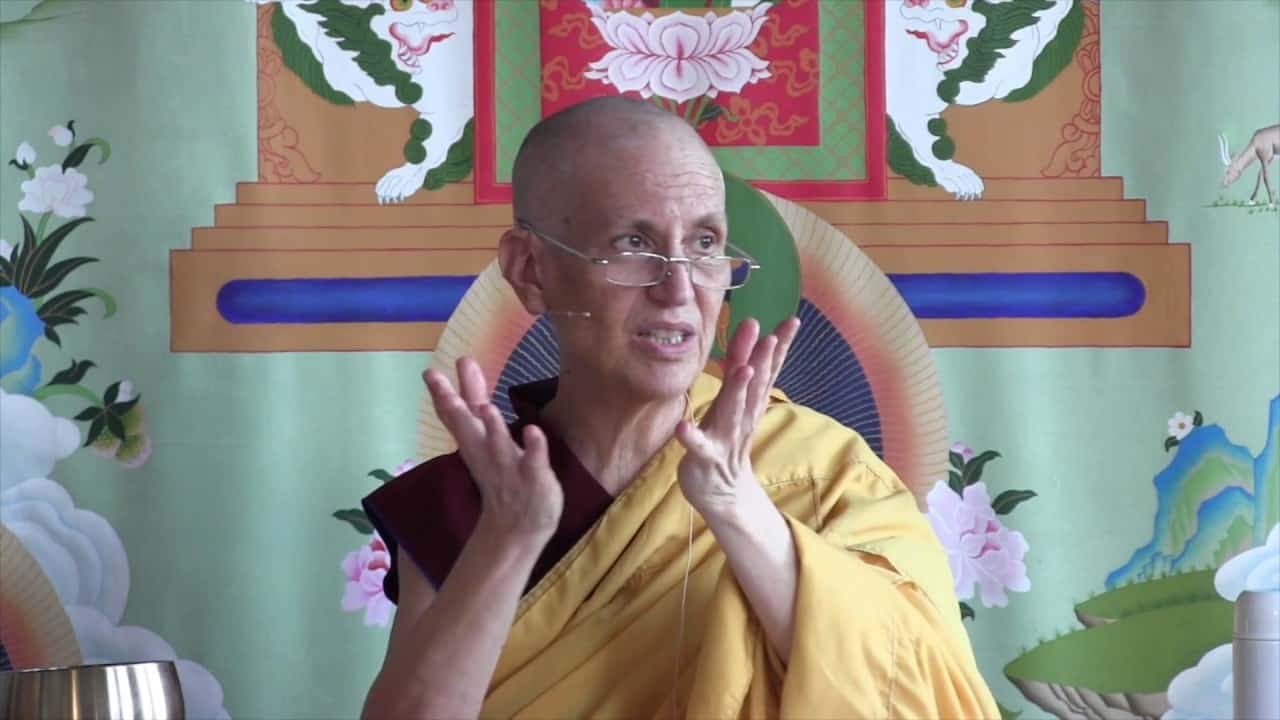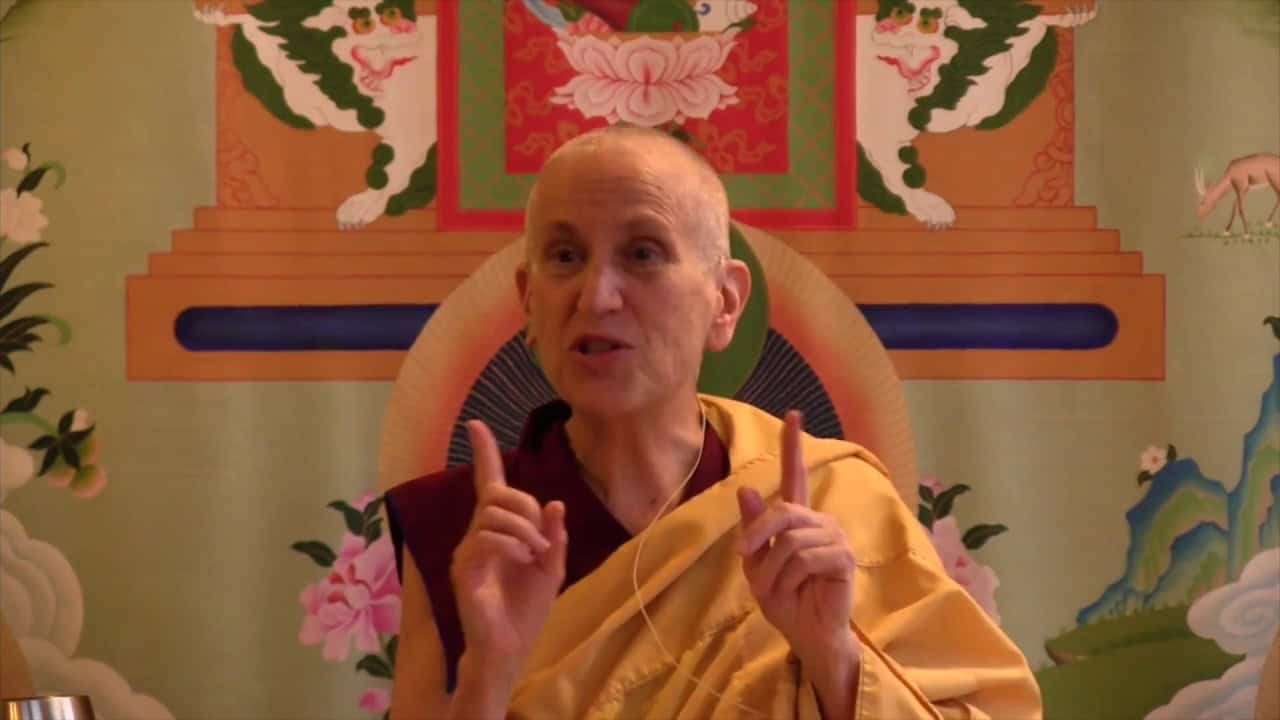Attributes of true paths: Accomplishment and irreversible
Part of a series of short talks on the 16 attributes of the four truths of the aryas given during the 2017 winter retreat at Sravasti Abbey.
- Clarifying the second attribute of true paths
- How this path allows us to accomplish our ultimate goal
- How wisdom brings irreversible liberation
I checked that one on the second attribute of true paths, and the Sanskrit term means “method” or “fit” or “right.” So, it’s clearly “suitable,” it’s not “awareness.”
The second one:
The wisdom directly realizing selflessness is suitable because it acts as the direct counterforce to the afflictions.
It’s suitable to be the path because it performs the function of the true path, because it’s the complete opposite of what ignorance perceives.
The third one:
The wisdom directly realizing selflessness is accomplishment because it unmistakently realizes the nature of the mind.
It’s accomplishment because, unlike worldly paths, this path allows us to accomplish our ultimate goal. Worldly paths you can practice them, you’ll get certain results, but we can’t attain liberation or awakening. Whereas this path enables us to accomplish our spiritual goal. Because it’s the direct antidote to ignorance.
Understanding this counteracts the misconception that worldly paths eliminate dukkha. That could be somebody thinking that the meditative absorptions in the form or formless realms, that they’re the antidote to dukkha. Or that doing extreme ascetic practices are the antidote to dukkha. There are many different ideas out there about what the path is. But showing that this one is accomplishment shows us that this is the one that actually works. That’s quite important because if it doesn’t work then there’s no use practicing it.
I find that interesting in the Buddha’s life story, for six years he did very, very severe ascetic practices, and then gave them up. People practiced them at that time–and still practice them now in India. You can see them. Thinking that if you torture the body that’s how you stop attachment to the body. But torturing ourselves does not eliminate the attachment. Sometimes it actually increases the attachment, because you become so focused on what you’re torturing yourself about not having or not doing. The Buddha’s always saying to get rid of attachment it has to be a mental way, it has to be a way through wisdom that counteracts that attachment.
The fourth attribute of true paths is,
The wisdom directly realizing selflessness is deliverance because it brings irreversible liberation.
Through practicing this true path, then all the afflictions can irreversibly be removed. True cessations can be irreversibly attained. I don’t know if you’re noticing, but a lot of these attributes of the path coincide with attributes of true cessations, too.
The first one of true cessation (people thinking there’s not a true cessation). The first one of the path (people thinking that there’s no path). Like this, we find they’re very close together. Mistaking worldly states for true cessations. Mistaking worldly paths for the path to liberation.
This one, too, because remember at true cessation the last one was that you could fall back from it? That it wasn’t final, it was reversible. That was the misunderstanding that the last attribute of true cessation counteracted. Here, too, this one of true paths counteracts the idea that a path can only get you so far, and you can’t get completely to liberation. Or even if you get completely to liberation, the path doesn’t continue to work and the afflictions will come back and you’ll fall down from it. All those kinds of wrong ideas that, if we believe those wrong ideas then we’re never going to practice. We’ll think the path doesn’t really work, or it’ll only get us so far but it won’t get us out of dukkha completely. Or even we get to nirvana we’ll fall back from nirvana. Or this path is circuitous, it doesn’t directly counteract ignorance, it kind of goes by the way and (meanders). All those kinds of wrong ideas that would discourage us from actually practicing the path.
When we really learn and contemplate these 16 then it very much helps us to really understand clearly what our situation is, what the cause of it is, the path to get out, and what the resultant state is, and that resultant state is possible to attain. And when we have that kind of conviction, then it makes sense to practice. Without a lot of conviction we start to practice, but when we don’t get results as quickly as we want, then let’s try something else. We’re like that, aren’t we? We want results quickly. Without a whole lot of effort. If you’ve been doing all this advertising about your path, and it’s not bringing the results, and I paid my $99.99, then I’m going to go to another path where maybe it’s $999.99, but that one is guaranteed. It’s guaranteed but it breaks too. If we start becoming like consumers going for the biggest, brightest ads in the Dharma, instead of really putting our effort in to check out the path and understand it well, and then practice it with diligence, over time. That’s what we need to do.
Audience: Question about the second one, true origin, I’ve really been puzzling over, that third one “that ignorance and karma are strong producers because they forcefully work to produce dukkha again and again.” That I can think about and that makes total sense to me. But if I think that’s what refutes the idea of a creator? I can’t make the connection about why that particular line of thinking is the refutation for the creator.
Venerable Thubten Chodron: Okay, so why is thinking that afflictions and karma produce dukkha repeatedly an antidote to the idea that there’s a creator. First let’s just check, you said that was the third of the origins. “They’re strong producers because they act forcibly to produce strong suffering.” Suffering in the upper realms and the lower realms. And we tend to think that our problems come from a creator.
So why does that way of thinking refute the creator? Because when you see that ignorance and karma produces the suffering in the upper realms, in the lower realms, everywhere, then you don’t need the idea of a creator that produces the world and produces suffering, because you’ve already tapped into what actually does produce that.
There’s a lot in the scriptures refuting this idea of an external creator and refuting a permanent cause. Both of those. This kind of idea, as we’ve talked about before, it’s very popular in many, many religions, including Western religions, not only Indian religions. And it’s something that many of us have in the back of mind somewhere, that the creator of our misery is some external being, and that the path out of our misery is by pleasing that being. So, if you believe that kind of thing, what you practice is going to be completely different from what we practice, in terms of the wisdom aspect of the path. In terms of generating forgiveness and love and compassion, they can be very similar, because in a theistic religion the idea is to please god you take care of other people. Whereas for us, you take care of other living beings because they’re exactly like you, wanting happiness and not suffering. So, same outcome, different reasons.
Think about these 16 and see if you have any of those wrong views floating around inside.
Venerable Thubten Chodron
Venerable Chodron emphasizes the practical application of Buddha’s teachings in our daily lives and is especially skilled at explaining them in ways easily understood and practiced by Westerners. She is well known for her warm, humorous, and lucid teachings. She was ordained as a Buddhist nun in 1977 by Kyabje Ling Rinpoche in Dharamsala, India, and in 1986 she received bhikshuni (full) ordination in Taiwan. Read her full bio.


